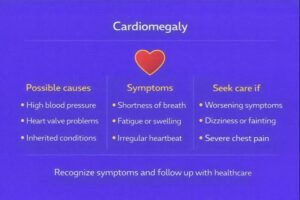Cardiomegaly (Enlarged Heart): Causes, Symptoms & Health Awareness

Cardiomegaly refers to an enlarged heart. It is not a disease on its own, but a sign that the heart is under strain or adapting to an underlying condition. An enlarged heart may have difficulty pumping blood efficiently.
Canadian first aid & workplace relevance
Cardiomegaly may affect people living with chronic health conditions such as high blood pressure or heart disease. Awareness of symptoms is important in workplaces, community settings, and family environments, especially for recognizing when medical assessment may be needed.
Scenario: Ongoing fatigue at work
An employee noticed increasing fatigue and shortness of breath during routine tasks. After medical evaluation, imaging revealed an enlarged heart linked to long-standing high blood pressure. With ongoing care, the individual adjusted activities and workload while monitoring symptoms.
Why the heart becomes enlarged
The heart may enlarge when it must work harder than usual. Common contributing factors include:
-
Long-standing high blood pressure
-
Heart muscle conditions (cardiomyopathies)
-
Heart valve problems
-
Previous heart injury or infection
-
Certain inherited conditions
Over time, extra workload can cause heart muscle changes.
Types of heart enlargement (general overview)
Healthcare professionals may describe cardiomegaly based on how the heart muscle is affected:
-
Dilated – the heart chambers stretch and enlarge
-
Hypertrophic – heart muscle walls thicken
-
Restrictive – heart muscle becomes stiff
These distinctions help guide medical evaluation but are not used for first-aid decision-making.
Possible symptoms
Some people with cardiomegaly have no noticeable symptoms. Others may experience:
-
Shortness of breath
-
Fatigue or reduced exercise tolerance
-
Swelling in legs or feet
-
Irregular or rapid heartbeat
-
Chest discomfort
Symptoms often develop gradually.
High blood pressure and heart strain
High blood pressure increases the effort required for the heart to pump blood. Over time, this strain may contribute to heart enlargement and reduced efficiency. Blood pressure management is commonly part of long-term heart care plans directed by healthcare professionals.
When to seek medical assessment
Medical evaluation is important if someone experiences:
-
Worsening shortness of breath
-
Persistent fatigue affecting daily activity
-
Swelling in lower limbs
-
Irregular heartbeat with dizziness
-
Chest pain or fainting
Sudden or severe symptoms should be treated as a medical emergency.
Living with cardiomegaly (awareness only)
People diagnosed with cardiomegaly often work with healthcare teams to:
-
Monitor heart function
-
Adjust daily activity levels
-
Manage contributing conditions
-
Attend regular follow-up appointments
Treatment plans are individualized and may change over time.
FAQ
Is cardiomegaly the same as heart disease?
No. It is a physical finding that may result from various heart or systemic conditions.
Can cardiomegaly be reversed?
In some cases, heart size may improve when underlying causes are managed, but outcomes vary.
Does everyone with cardiomegaly have symptoms?
No. Some people are diagnosed incidentally during imaging tests.
Is cardiomegaly always serious?
Severity depends on cause, progression, and overall heart function.
Educational note
This article provides general awareness of cardiomegaly for public health and first-aid education. Diagnosis and treatment decisions are made by qualified healthcare professionals.
